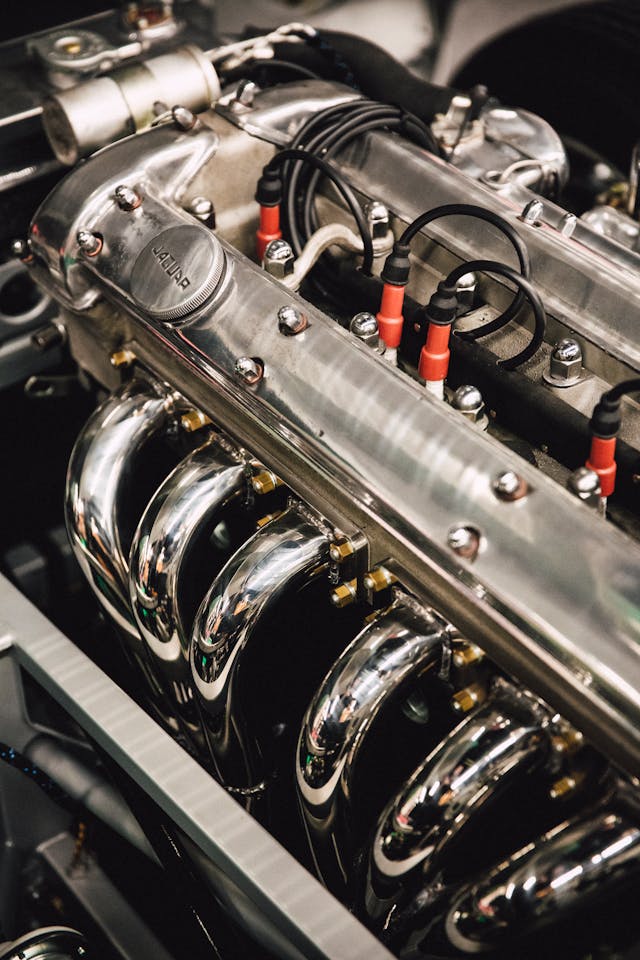Familiarizing yourself with your car’s basic components and their roles can help you maintain your vehicle better, diagnose issues early, and make informed decisions about repairs. Here’s an in-depth look at the essential parts of your vehicle and their functions.
Engine
The engine converts fuel into mechanical energy, which powers the vehicle. Most cars have internal combustion engines, which use a mixture of fuel and air ignited by a spark plug to create a small explosion that moves the pistons. These pistons then turn the crankshaft, which powers the wheels of the car. Understanding the engine’s basic mechanics helps you see why regular maintenance, such as oil changes and air filter replacements, is important to keeping the car running smoothly.
Transmission
The transmission transfers the engine’s power to the wheels. It adjusts the power output to ensure that the car operates efficiently at all speeds. There are two main types of transmissions: manual and automatic. With a manual transmission, the driver manually shifts gears using a clutch pedal and gear stick. You rarely see manual transmissions these days, however, unless the car is a classic car. An automatic transmission changes gears on its own, based on the car’s speed and acceleration. Regular transmission fluid checks and changes are crucial to avoid costly repairs.
Battery
The car battery provides the electrical power needed to start the car’s engine and operate electrical components like the lights, the radio, and climate control. It stores energy generated by the alternator while the car is running and releases it when needed. Batteries typically last 3 to 5 years, but extreme temperatures and frequent short trips can shorten their lifespan. Regular battery checks and replacements are necessary to prevent starting issues and ensure the reliability of your vehicle.
Alternator
The alternator works in tandem with the battery to convert mechanical energy from the engine into electrical energy. That energy recharges the battery and powers the car’s electrical systems while it’s being driven. If your alternator fails, your car will eventually lose power and stop running. Common signs of alternator problems include dimming lights, a dead battery, and electrical issues. Keeping an eye on these symptoms can help you address alternator issues before they lead to a breakdown.
Radiator
The radiator is part of the car’s cooling system. It regulates the engine’s temperature by dissipating the heat generated during combustion. Coolant, a mixture of water and antifreeze, circulates through the engine and absorbs heat. The heated coolant then passes through the radiator, where it is cooled by airflow before being returned to the engine. Regularly checking and maintaining the coolant level in your car and ensuring the radiator is free of debris will help prevent overheating and engine damage.
Brakes
Brakes are a critical safety feature, allowing you to slow down or stop the car. The brake system comprises brake pads, rotors, calipers, and brake fluid. When you press the brake pedal, hydraulic fluid transfers the pressure to the brake calipers, which squeeze the brake pads against the rotors. This friction slows down the wheels and stops the car. Regular brake inspections, fluid checks, and replacing worn brake pads are essential for maintaining effective braking performance.
Suspension
The suspension system includes springs, shocks, and struts, which work to absorb and dampen the impact of road irregularities, providing a smooth and stable ride. Your car’s suspension system also helps keep your tires in contact with the road, improving handling and safety. If you notice a rough ride, excessive bouncing, or uneven tire wear, it might indicate suspension issues that need addressing. Regular inspections can help identify and resolve problems before they affect your vehicle’s performance and comfort.
Tires
Tires are the only part of your car that is in direct contact with the road, making them crucial for safety and performance. Proper tire maintenance involves regular checks of tire pressure, tread depth, and alignment. Underinflated or overinflated tires can affect handling, fuel efficiency, and tire lifespan, while worn tread can reduce traction and increase the risk of accidents. Rotating your tires regularly and making sure they are properly aligned can extend their life and enhance your vehicle’s safety.
Fuel System
The fuel system stores and delivers fuel to the engine. It includes the fuel tank, fuel pump, fuel injectors, and fuel lines. The fuel pump draws fuel from the tank and sends it through the fuel lines to the injectors, which spray it into the engine’s combustion chambers. Maintaining a clean fuel system with regular fuel filter changes and using quality fuel can prevent clogs and ensure efficient engine performance.
Exhaust System
The exhaust system directs and treats the gases produced during combustion, reducing noise and emissions. It includes components like the exhaust manifold, catalytic converter, muffler, and tailpipe. The catalytic converter converts harmful gases into less harmful emissions, while the muffler reduces noise. Regularly inspecting the exhaust system for leaks, damage, and verifying that the catalytic converter is functioning properly will help keep emissions in check and reduce your car’s environmental impact.
Electrical System
The electrical system encompasses the wiring, fuses, and various sensors that manage everything from engine performance to interior lighting. This system ensures that all of the electrical components, such as the ignition system, lights, and infotainment system, work correctly. Faulty wiring or blown fuses can cause electrical failures, so they should be addressed promptly. Regularly checking the condition of your car’s electrical system and replacing fuses as needed can prevent other issues.
Understanding the basic components of your car and their functions is essential for proper maintenance and early problem detection. Regular maintenance, such as oil changes, fluid checks, tire rotations, and brake inspections, can extend the life of your vehicle and ensure it operates safely and efficiently. By familiarizing yourself with these key parts and their roles, you can become a more informed and responsible car owner.
